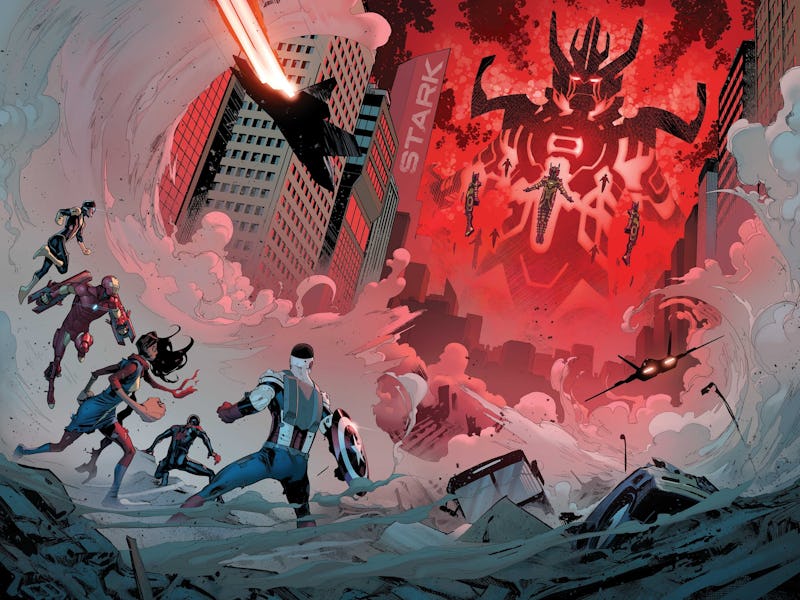War Machine, Inhumans, and How Marvel's 'Civil War II' Comic Resonates
Despite a sci-fi plot, the key deaths in 'Civil War II' emphasize the new series' place in superhero-as-allegory.

This article contains spoilers.
It’s easy to dismiss Marvel’s return to the “Civil War” concept in the new Civil War II led by writer Brian Michael Bendis. But the story presented in Issue #1 released this week is more than just synergy with Joe and Anthony Russos’ super-successful Captain America: Civil War. Leaning heavily into theoretical science-fiction concepts, Civil War II ditches the 2006 original’s commentary on post-9/11 paranoia and instead questions pre-emptive responsibility. If superheroes — or indeed, anyone capable — could prevent bad things happening before they actually do, is it their responsibility to stop it?
There’s no answer, at least not yet as the story has just kicked off. While there was a ton of build-up seen in Marvel’s “Road to Civil War” multi-series prologues, Bendis does a solid job in Civil War II #1 setting up the necessary stakes, plot elements, and character motivations in frugal fashion. You can jump into Civil War II #1 with a passing familiarity of the Marvel heroes without needing to read the one-shots. (Not that doing your homework can’t hurt, though.)
But why fight this time? A perfectly average student with the perfectly average name Ulysses discovers he’s an Inhuman. If you don’t read comics or watch Agents of S.H.I.E.L.D., Inhumans are individuals with alien DNA (and Marvel’s replacements for mutants, since those belong to Fox now) whose abilities awaken by a process known as Terrigenesis. But Ulysses can’t fly or shoot lasers. Rather, he’s prescient, a very powerful one, and foresees a cataclysmic event in Manhattan.
Like this one.
Civil War II opens with that very cataclysmic event: a giant Celestial attacking bringing almost everyone active in the Marvel Universe to fight. The heroes win, but behind closed doors at Tony Stark’s afterparty Captain Marvel (Carol Danvers) and Stark learn how the Inhumans and its leading royal family knew about the attack. They reveal Ulysses, to Danvers’s hope and Stark’s disgust. Danvers’s motivations are easy to see: Stop threats before they are threats. But Stark, who was an antagonistic, domineering authoritarian in the original Civil War, has learned not to be on that side of history. As a futurist, Stark proclaims, he knows enough not to mess with it.
Stark’s convictions are validated weeks later when Danvers leads a team, including a volunteering Rhodey, a.k.a. War Machine and Stark’s best friend, to ambush the super-villain Thanos. The fight was bloody and brutal, with Rhodey killed and She-Hulk flatlining (Marvel editor Tom Brevoort is being coy about She-Hulk, but confirms Rhodey is capital-D dead). For Stark, the fight has just gotten personal.
Ulysses, the new Inhuman, whose presence divides the Marvel Universe once again.
Already there is more resonance in Civil War II than in Mark Millar’s 2006 original Civil War, even if that story was more “grounded” in the palpable reality of the Iraq War and P.A.T.R.I.O.T. Act paranoia. The fight is personal, with the inciting incident the death of one superhero and not 600 in Connecticut. That matters now as superhero media has regularly become disaster porn, mining cultural fears of urban terrorism (Man of Steel, The Avengers) to generate stakes. For a war that’s threatening to alter the whole Marvel Universe — and indeed, has already taken the life of one — Civil War II is refreshingly restrained. This is a story about preventing disasters, not reacting to them.
Superhero media is a flexible genre. One can read whatever they please, and it helps that comic writers are so often politically-minded. So I wonder, given yet another stupid fucking shooting yesterday, if Civil War II will end up (intentionally or not) as one big sci-fi allegory for real-world gun control. The only thing to stop bad guys with guns is good guys with guns, so that adage goes. In Marvel’s case, to stop super-villains is with superheroes. That’s worked for generations, and indeed is the single purpose for the entire genre. But Civil War II’s position as a tale about prevention propels it firmly into the timely discussion we as mere, non-superpowered folk cannot have without escalating into a feverish shouting match. For now, Civil War II looks ready to do our fighting for us.